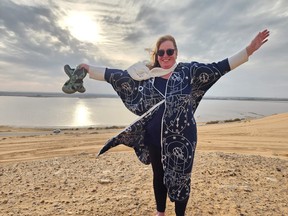
A Brantford driving instructor is helping remove roadblocks for Saudi Arabian women.
Advertisement 2
Article content
For more than two years, Sylvia Collins has been traveling to the Middle Eastern country to train women to teach other women to drive. Saudi Arabia was the last country in the world to repeal its ban on women drivers. In June 2018, women were allowed to drive again in the kingdom following many decades of prohibition.
Article content
“The reaction to this opportunity for choice was across the spectrum,” said Collins, who was back in Brantford for a short visit recently before returning to Saudi Arabia. “Some said no. Others were breaking down the door to get in.”
Not one to step away from a challenge, Collins’s resume includes career stints working in cable television, as a welder, and as a support worker for those with developmental disabilities. She once rode her motorcycle on a solo trip to Alaska where she pitched a tent in the wilderness for several weeks. And, for most of the past 40 years, the Brantford native has worked as a driving instructor, teaching both in the car and the classroom.
Advertisement 3
Article content
“No one ever wakes up one day and says ‘I want to be a driving instructor,’” Collins, a 62-year-old grandmother, said with a laugh. “But I saw an ad in the paper and applied. I loved it right away. There’s a thing that happens when someone is learning something new. You have to understand how they learn and when the learning has stopped. That’s fascinating to me.”
In July 2021, Collins jumped at the chance to teach Saudi women, who were now more than two years into their freedom to drive, to become instructors. Knowing pretty much nothing about the country, she left a month later planning to return to Brantford in three weeks.
Collins was met at the airport in the capital of Riyadh by three men, including her employers and the person “tasked with keeping me safe and happy”, and handed an abaya, a robe-like dress worn by some women in parts of the Muslim world, which covered her from her neck to her ankles to her wrists.
Advertisement 4
Article content
“I got on another plane and flew to the smaller city of Najran where I taught a class of nine women to be driving instructors. Some of them didn’t even have a driver’s license.”
Because everyone spoke Arabic, Collins, who has been teaching non-English speakers in Canada for decades, was adept at using pictures, hand gestures and a translation app on her phone to communicate. She’s also taking Arabic lessons and has learned the basics of reading and writing.
More difficult to adapt to are the prohibitions on what Saudi women can and cannot do even after a recent set of social reforms. Permission from a male relative is still required by many women related to marriage, business, education and other aspects of life. Freedom of opinion remains seriously restricted.
Advertisement 5
Article content
“I keep a journal,” Collins said. “It starts, ‘My voice here is very quiet.’”
Still, she said the country, which has a coastline along both the Red Sea and the Persian Gulf with terrain consisting largely of sandy and rocky desert and mountains, is “breathtakingly beautiful.”
And Collins feels she’s helping make a difference. She has met two of three goals she set for herself when she took on her job.
“I wanted to see women become motorcycle instructors and I wanted to see men and women in the same room (taking driving instructor lessons).”
Collins, who has written driver training programs for motorcycles and transport trucks, is now writing the outline of a program that would lead to her third goal – to require Saudis get their driver training on roads instead of “arenas” — huge parcels of empty land .
Advertisement 6
Article content
“The driving there is outrageous. The crash rates are six times higher than in Canada. There are major highways and traffic circles but nobody has been taught how to manage them.”
In the meantime, Collins said giving women the right to drive “changes the economics of families and a community.” It allows women to be more independent, children to have more access to activities outside the home, and reduces the number of under-age boys getting behind the wheel to act as family chauffeur.
Collins said leaving her own family for long stretches of time is very difficult — she’s typically gone for months — but she isn’t sure when her adventure will end.
“All my life I’ve had responsibilities. You don’t really get to have dreams, it’s just on to the next thing. Now is a time in my life when I don’t have to be responsible for others.”

Article content
